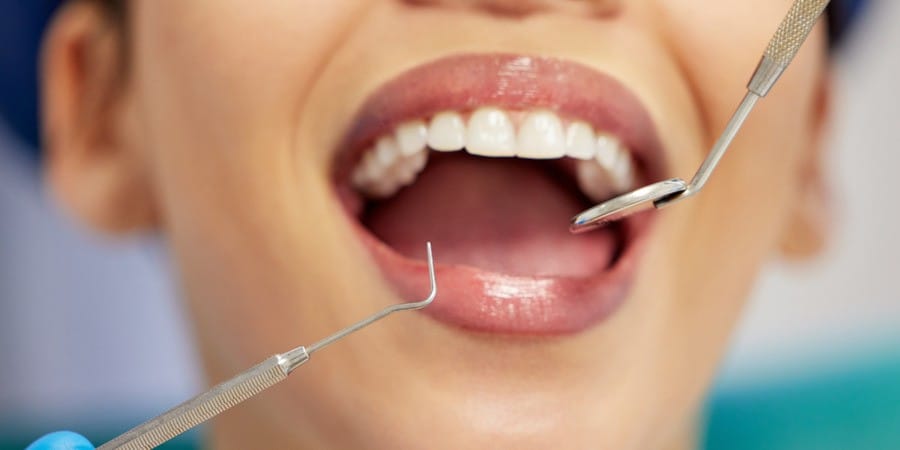This article explains which foods to eat when you first begin wearing dentures and what to expect as you get used to them. After a short while, you should find you can eat a reasonable range of foods comfortably, although you may need to make some permanent dietary changes.
Which Foods to Eat Initially
It’s perfectly normal to find your new denture feels a bit strange as your tongue and facial muscles need to learn how to accommodate it. It’s also perfectly normal for a new denture to cause some sore spots on your gums due to the unaccustomed pressure.
Therefore, choose foods that require minimal chewing at best. You will find softer foods are more comfortable to eat, placing less stress on the underlying gum tissue and reducing the risk of gum irritation and discomfort.
Softer foods to choose from can include:
- Cottage cheese or soft cheese.
- Poached fish.
- Scrambled eggs or omelets.
- Yogurt.
- Mashed potato.
- Mac and cheese.
- Egg or tuna salad.
- Thinly cut meats like turkey or ham that require minimal chewing.
- Rice dishes.
- Pancakes.
- Oatmeal.
- Soft rolls or muffins.
- Cooked fruit.
- Soft fruits like strawberries, raspberries, or bananas.
- Applesauce.
As you can see, there is a huge range of different foods you can choose from, and your dentist can give you more advice on how to tailor your dietary choices to suit your nutritional needs.
Because dentures can cover your upper palate, you may find food tastes differently. Over time, any differences should decrease.

Read more: What are the Stages of Periodontal Disease?
How to Learn to Eat with Dentures
Expect to spend at least a few weeks learning how to eat with your new dentures. Following the tips below will help you get accustomed to them more quickly.
- Chew food using both sides of your mouth, which will help to keep your denture balanced and strengthen your facial muscles.
- Chew food slowly and thoroughly, taking your time.
- Avoid foods that are hard to chew and could damage your dentures or any foods that are sticky and could become stuck to your dentures and difficult to remove.
- Eat foods that are warm rather than hot. When you wear dentures, it can be difficult to sense when foods are too hot, and you could risk burning your mouth.
- Ensure you drink plenty of water, as wearing a denture can affect saliva production, causing dry mouth. Contact your dentist for help and advice if your mouth is too dry. They may prescribe an artificial saliva substitute to help your mouth feel more comfortable.
Introducing More Foods into Your Diet
As you get used to eating with dentures, you can gradually introduce more foods into your diet.
Below are some more tips to help make this transition smoother.
- Your food into smaller pieces that are easier to chew, especially when you are still getting used to biting into foods with dentures.
- Continue chewing your food on both sides of your mouth, but try switching from one side to the other to find out if this is easier.
- Gradually introduce firmer foods that require more chewing as you get more confident with your dentures.
- Continue avoiding sticky foods, including marshmallows, raisins, and peanut butter, as these can dislodge your dentures.
- If your dentures dislodge, reposition them using your tongue and bite down gently on both sides. This should help place them in the proper position and increase suction.
Read more: Preparing for Gum Graft Surgery: A Step-by-Step Guide
Living with Dentures
When you are completely accustomed to wearing your dentures, you should be able to eat a wide range of foods. However, be aware that some foods will be tricky to eat, including any that are tough, hard, or sticky.
You may need to avoid these foods entirely, and they include:
- Corn on the cob.
- Tough meats like chewy steak.
- Nuts.
- Crusty bread.
- Hard and sticky candies.
- Raw, crunchy vegetables.
- Lettuce.
- Popcorn.
The Problem with Traditional Dentures
Traditional dentures that rest solely on your gums can be increasingly uncomfortable to wear, especially as jawbone resorption occurs. When you lose natural teeth, your jawbone resorbs over time since it no longer receives the stimulation provided by tooth roots.
Consequently, even a well-fitting denture will become increasingly loose, making it trickier to eat comfortably and talk confidently without fear of your denture moving around or starting to click embarrassingly.
One option is to consider dental implant dentures.
Read more: Why Does It Pain Two Weeks After Your Dental Bone Graft
What Is an Implant Denture
An implant denture looks just like an ordinary denture but works a little differently. Implant-supported dentures do not rest on the gums and instead are supported by dental implants, tiny posts, or screws that are inserted into your jawbone. An implant-supported denture clips onto the implants so it cannot move once in place. It will be firmly held in position until you snap out the denture for cleaning.
An implant denture will provide you with teeth that feel strong and stable. Your biting strength will be greater compared to a traditional denture. However, you would still need to get used to eating foods with an implant denture, just like a traditional denture.
An implant-supported denture can be a good, affordable choice since often only a few dental implants are needed to support a complete arch of teeth. Also, an upper implant denture will not cover your upper palate and is less bulky than an ordinary upper denture. Instead, it is shaped like a horseshoe, similar to a lower denture, so the tastebuds in your upper palate are uncovered.
Who Can Have Implant Dentures?
If dental implants sound interesting, seeing a skilled implant dentist like a periodontist is best. They can assess your mouth and review your overall health to determine if implants are suitable, and if so, discuss the right kind of treatment for your needs.
When you see an implant dentist, they can decide how many dental implants are needed to hold your denture firmly in place and can provide you with a good overview of the treatment required. Because of how the implants are situated for an implant denture, the need for other treatments like bone grafting is minimized or avoided altogether.
Read more: What Happens During a Dental Crown Procedure?
What about Getting Rid of Dentures Completely?
solution for tooth loss. However, if you hate the thought of having removable teeth, then discuss a dental implant bridge with an implant dentist instead.
A dental implant bridge is permanently fitted in your mouth and is made from a strong ceramic material. It will almost fully restore your biting strength so you can eat whatever you wish.
However, it is a more expensive option, and you may find that after discussing treatments with your implant dentist, you will be perfectly happy with an implant-supported denture.
Complete tooth loss is a common problem, but traditional dentures are only one solution. Nowadays, more people are choosing dental implants to replace missing teeth more securely. Implant treatment is also a long-term solution. With the proper planning and right after-care, your implant teeth should last for years. Some people will have their dental implants for life.

